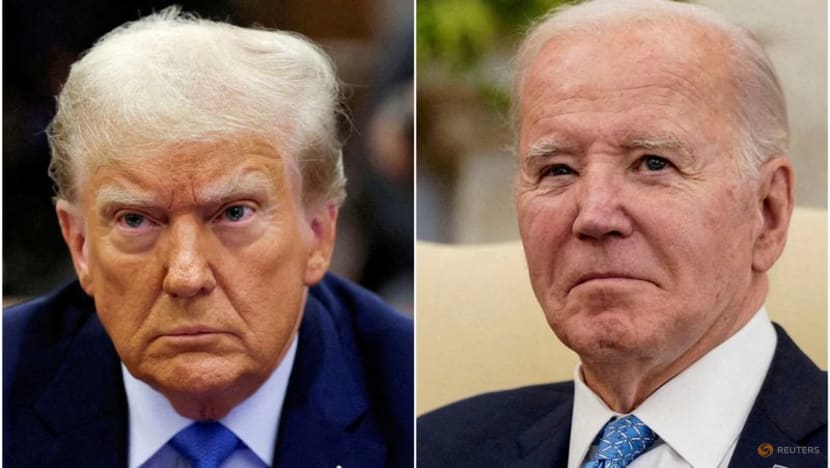Commentary: Who would China want as the next US president, Biden or Trump?
As the 2024 US presidential race heats up, China is once again being used as a political punching bag. RSIS’ Jonghyuk Lee weighs in on who China might be rooting for in a potential Biden-Trump presidential rematch.


This audio is generated by an AI tool.
SINGAPORE: The Biden administration on May 14 announced that it would quadruple tariffs on Chinese electric vehicle imports to 100 per cent. This decision highlights the persistent aggressive stance of the United States toward China, irrespective of whether Democrats or Republicans are in power.
Come November, US voters are set to face a election rematch between President Joe Biden and his predecessor, Donald Trump. Recent polls show they are in a neck-and-neck race. Much of the world will be watching closely, as will China, who is often caught in the crossfire as candidates claw for voter support.
After Mr Biden announced the tariffs, Mr Trump was quick to strike, saying: “China’s eating our lunch”. He added that there should be tariffs on "much more than electric vehicles".
The incumbent fired back: “He's been feeding them a long time”.
This back-and-forth suggests that China will once again be used as a political punching bag in the upcoming election. No matter who wins, their tough-on-China stance is unlikely to change significantly. The devil, however, lies in the details.
In pivotal areas like Taiwan relations, global leadership and domestic narratives, Mr Trump may be slightly more favourable for China and President Xi Jinping.
Mr Biden’s approach is firmly grounded in multilateralism and international alliances, while his predecessor's openness to negotiations, international isolationism and blunt domestic rhetoric offer China more opportunities to expand its global influence and bolster domestic stability.
TAIWAN RELATIONS: STRATEGIC AMBIGUITY VS STRATEGIC CLARITY
On Taiwan, Donald Trump's unpredictability presents a more complex challenge for Xi Jinping than Joe Biden's consistent support for the island. Mr Trump sees Taiwan primarily as a strategic asset in US-China negotiations, often hesitating to commit to its defence.
In a July 2023 Fox News interview, he was asked directly if he would defend Taiwan against a Chinese attack. He evaded the question. "If I answer that question, it'd put me in a very bad negotiating position," he said. “With that being said, Taiwan did take all of our chip business,” he continued, highlighting his grievances with Taiwan instead.
Former US National Security Adviser John Bolton also revealed in his memoir that Mr Trump regarded Taiwan as relatively insignificant, comparing it to the tip of a Sharpie pen.
Such an ambiguous approach to Taiwan inadvertently emboldens China to adopt a more aggressive stance toward the island, especially given the perceived low probability of US military intervention under a second Trump administration. This was evidenced by a Chinese spokesman's statement in January that Taiwan could end up a “discarded chess piece at any time” if Mr Trump were re-elected.
This perspective, however, assumes that the costs of defending Taiwan outweigh the benefits for Mr Trump. Is this assumption accurate, though? Does he genuinely regard defending Taiwan as merely a cost devoid of benefits for the US?
Mr Trump’s strategic framework might perceive defending Taiwan as providing considerable long-term security advantages. By supporting Taiwan, the US prevents China from securing unrestricted access to the Pacific Ocean, a move that could significantly limit China’s regional influence.
Some have suggested that this ambiguity is deliberate. By making inconsistent statements, he keeps adversaries guessing, compelling them to disclose their strategies first. However, this strains diplomatic relations and introduces uncertainty into international policy.
Mr Trump's erratic approach forces Beijing to prepare for various scenarios. In contrast, Mr Biden’s unwavering stance on defending Taiwan allows China to formulate a predictable strategic response.
Mr Xi could see potential in influencing Mr Trump through negotiations if China offers incentives that outweigh the strategic value of supporting Taiwan. Mr Biden's steadfast policy positions constrain such opportunities.
Negotiating with Mr Trump, possibly linking Taiwan to other geopolitical considerations like Russia, could sway his support. This could potentially aid Mr Xi in his lifelong ambition: Taiwan reunification.
GLOBAL LEADERSHIP: ISOLATIONISM VS INCLUSIVISM
When former president Trump was in power, he favoured bilateral agreements over multilateralism, resulting in a notable shift in US global leadership. This created a void that China swiftly exploited to assert its influence.
For instance, in 2017, the US announced its withdrawal from the Paris Climate Agreement, arguing it undermined the nation's economy and sovereignty. In 2018, the US withdrew from UNESCO, citing the organisation’s purported anti-Israel bias. Mr Trump also exited the Trans-Pacific Partnership (TPP) trade deal and frequently criticised the North Atlantic Treaty Organization (NATO) and World Trade Organization (WTO).
China's efforts like the Belt and Road Initiative (BRI) have undercut US influence, financing extensive infrastructure projects and presenting itself as a credible alternative to American leadership.
Moreover, China’s enhanced involvement in the World Health Organization (WHO) and the United Nations Human Rights Council (UNHRC) has bolstered its soft power and influence in global health and human rights policies. Economically, China's Regional Comprehensive Economic Partnership (RCEP) has deepened its integration into regional trade networks, especially following the US' TPP exit.
When President Joe Biden took over, he asserted American leadership on the global stage, particularly in areas like climate change and public health, where China has sought to expand its influence.
By rejoining international commitments that his predecessor withdrew from, Mr Biden aims to counterbalance China's growing global presence and advocate for a world order that reflects democratic values and human rights. His approach to China involves pushing back in both traditional and non-traditional security domains, aiming to limit China's influence, especially over the Global South.
From Mr Xi's perspective, this renewed American engagement represents a significant challenge. While Mr Trump's isolationist tendencies boosted China's global stature, Mr Biden's strategy of active US engagement and leadership in global governance directly challenges China's narrative.
Still, US foreign policy remains uncertain and can swiftly shift depending on the administration. If Mr Trump secures re-election and pursues isolationist policies, it may erode trust in the US commitment to international affairs again, providing Mr Xi with an opportunity to bolster China's alliances.
DOMESTIC NARRATIVES: NATIONALISTIC RHETORIC VS DIPLOMATIC ENGAGEMENT
During the Trump presidency, nationalistic rhetoric and confrontational language towards China polarised the relationship. In a 2016 campaign rally, he accused China of “raping” the US while criticising its trade policies.
During the COVID-19 pandemic, Trump repeatedly referred to the virus as the “Chinese virus,” which critics argued fuelled xenophobia and anti-Asian sentiments. More recently in February, he pledged to impose tariffs of more than 60 per cent on Chinese goods if re-elected.
For Mr Xi, this confrontational rhetoric is beneficial. By portraying China as a victim of unwarranted American aggression, he can rally nationalistic sentiments, consolidate his domestic standing and divert attention from domestic issues such as an economic slowdown, a housing crisis, and youth unemployment.
In contrast, the Biden administration takes a more diplomatic approach. Acknowledging the competitive nature of the US-China relationship, Mr Biden seeks areas of potential cooperation while addressing issues like human rights abuses and aggressive actions in the South China Sea.
Though not always successful, he pursues engagement by dispatching officials like Commerce Secretary Gina Raimondo and Secretary of State Antony Blinken to China.
This strategy limits Mr Xi's ability to stoke nationalist sentiments against the US, as it is the US initiating engagement.
By prioritising collaboration and toning down confrontational rhetoric, Mr Biden leaves less room for Xi to exploit anti-US sentiments domestically.
Dr Jonghyuk Lee is an assistant professor at the S Rajaratnam School of International Studies, Nanyang Technological University, and held a post-doctoral fellowship at Tsinghua University.

















